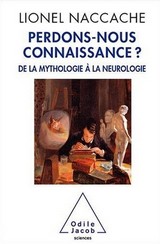Lionel Naccache, a French neurologist has just published a book in France, titled Are We Loosing Knowledge? From Mythology to neurology, where he argues that contrary to the general belief, we are not in an era of knowlege but simply of information. He makes the clear distinction between both terms. While we may be submerged by information, we hardly have any knowledge of things. Knowledge requires a grasp on danger he argues and this notion seems absent from what we are informed about nowadays. This ends up creating brain patterns difficult to overcome. In fact we could say the Nazis take on races was information (or propaganda) and this is the difference between information and knowledge. The difference between propaganda and knowledge might be the feeling of danger or plain falsehood of the former over the latter. This issue was also treated much earlier in the decade but with good reflections during this broadcast: BBC Radio 3 Night Waves – Undercurrents Wednesday November 14, 2001 Knowledge and Information in the Modern World (mp3) With host Philip Dodd And guests: A.S. Byatt, novelist; A. C. Grayling, philosopher; Charlie Leadbetter, journalist; Jonathan Sawday, cultural historian; Sadie Plant, academic and cultural commentator (in Birmingham). With clips from Valentine Cunningham (academic), and a passage from John Bunyan’s Pilgrim’s Progress. An account of what was said is available here.
If you understand french there is a link about the very book and its authors at the end of the french version down.
§ § §
 Lionel Naccache, neurologue français vient de publier un livre qui s’intitule Perdons-nous connaissance? · De la mythologie à la neurologie où il avance que contrairement à la croyance générale nous ne sommes pas entrés dans une ère de connaissance mais simplement d’information. Il fait clairement la distinction entre les deux termes. Alors que nous sommes submergés d’information, nous n’avons que peu de connaissances des choses. Selon lui, la connaissance requiert un sentiment de danger, notion qui semble absente de cela dont on nous informe. Cela finit par créer des patterns cérébraux dont il est difficile de se dépatouiller. On pourrait avancer que l’argumentation nazis sur les races était de l’information (ou de la propagande) et que c’est là la différence entre information et connaissance. La différence entre l’information et la connaissance pourrait être le sentiment de danger ou de fausseté entre le premier et le dernier. Perdons-nous connaissance? · De la mythologie à la neurologie Avec une entrevue avec l’auteur
Lionel Naccache, neurologue français vient de publier un livre qui s’intitule Perdons-nous connaissance? · De la mythologie à la neurologie où il avance que contrairement à la croyance générale nous ne sommes pas entrés dans une ère de connaissance mais simplement d’information. Il fait clairement la distinction entre les deux termes. Alors que nous sommes submergés d’information, nous n’avons que peu de connaissances des choses. Selon lui, la connaissance requiert un sentiment de danger, notion qui semble absente de cela dont on nous informe. Cela finit par créer des patterns cérébraux dont il est difficile de se dépatouiller. On pourrait avancer que l’argumentation nazis sur les races était de l’information (ou de la propagande) et que c’est là la différence entre information et connaissance. La différence entre l’information et la connaissance pourrait être le sentiment de danger ou de fausseté entre le premier et le dernier. Perdons-nous connaissance? · De la mythologie à la neurologie Avec une entrevue avec l’auteur
France Culture
Science publique
Vendredi 19 mars 2010
La connaissance est-elle encore dangereuse?
(mp3)
(64/44 stéréo, 27,5 megs, 57m25s)
